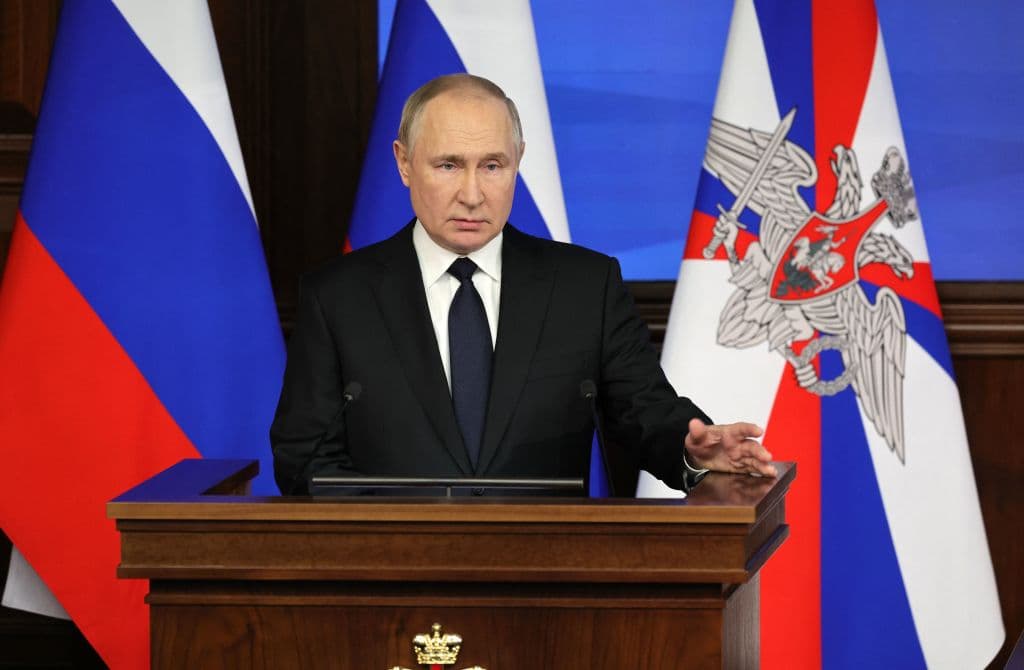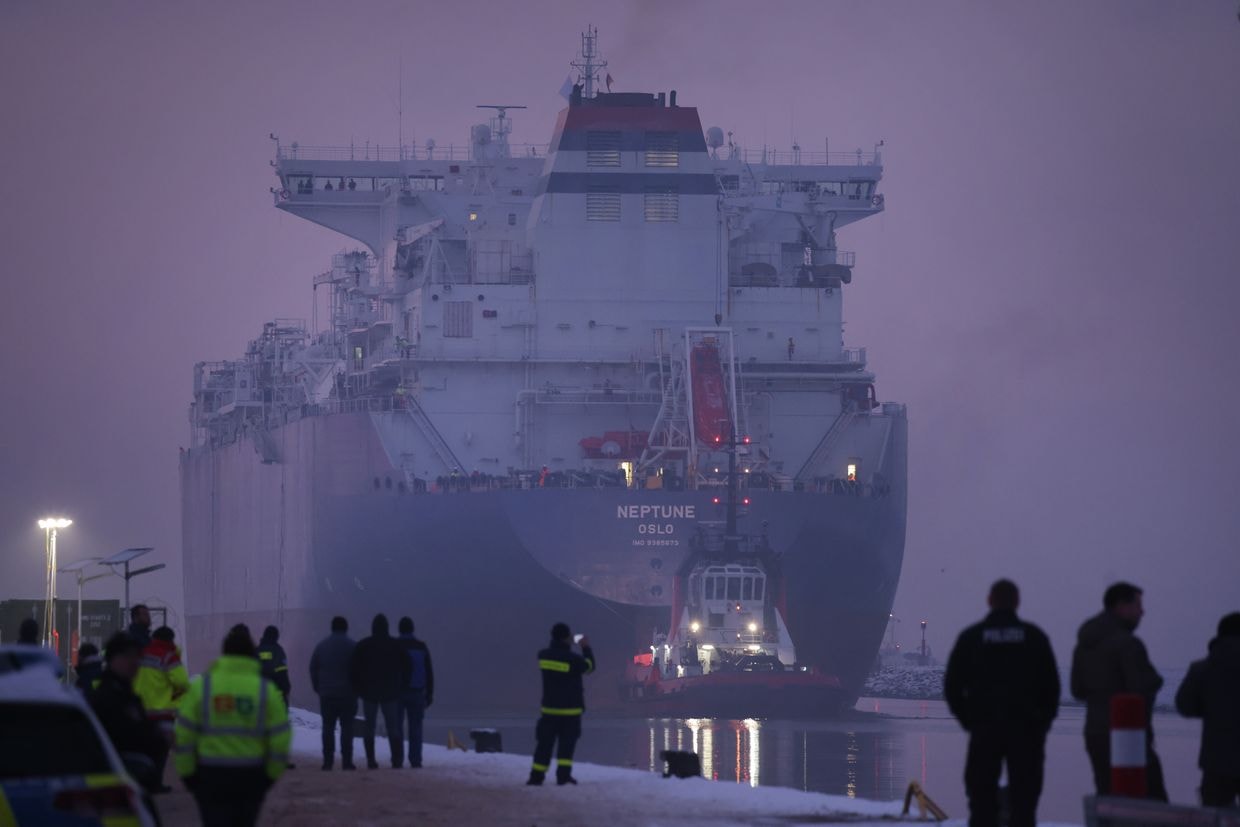Nataliya Bugayova: Target Russia's capability, not its intent

Editor’s Note: This is an analysis by Nataliya Bugayova, a Russia Research Fellow at the Institute for the Study of War (ISW), a U.S.-based defense and foreign affairs think tank. This piece was originally published by the ISW on Dec. 20, 2022. The Kyiv Independent has republished the analysis with permission. The opinions expressed in the op-ed section are those of the authors and do not purport to reflect the views of the Kyiv Independent.
US policy should recognize that the Kremlin’s intent regarding Ukraine is maximalist, inflexible, and will not change in the foreseeable future. The West should stop expending resources trying to change a reality it does not control, and focus on what it can shape plenty: denying Russia’s ability to wage a war against Ukraine.
Negotiations, ceasefires, and peace deals are not off-ramps but rather on-ramps for the Kremlin to renew its attack on Ukraine in the future under conditions that advantage Russia. They are means to the same ends—full control of Ukraine and eradication of Ukraine’s statehood and identity.
The vital US interest in preventing future Russian attacks on Ukraine can be best achieved by denying Russia the capability to carry out those attacks. The immediate requirement is preserving Ukraine’s momentum on the battlefield—accounting for a possible renewed offensive from Russia this winter—to ensure that Ukraine secures the most advantageous position possible.
The West should also eliminate Russia’s ability to attack Ukraine in the future, including by denying Russia a military foothold in Ukraine from which to launch attacks, resisting "peace" deals that the Kremlin will use to buy time to reconstitute its forces, not empowering the Russian defense industrial complex with access to Western markets, and committing to building Ukraine's defensive capabilities over the long term.
Persistent intent
Russian President Vladimir Putin’s intent toward Ukraine has not changed and likely never will. Putin’s intent will most likely outlast him—by design. Russia will use any territory it keeps in Ukraine to stage future attacks.
Putin’s goals in Ukraine always exceeded countering NATO or forcing Ukraine into neutrality. Despite Western assumptions, Putin has never been content with the territorial gains he made in Ukraine in 2014 because control of Ukraine, not its territory, has been his goal. The Kremlin has made clear in word and action over the past 20 years that it will accept nothing less than full control over Ukraine.
Putin has tried to gain control over Ukraine in increasingly extreme ways: by trying to dominate Ukraine’s politics in the 2000s and early 2010s; via military intervention in 2014 and the manipulative peace frameworks that followed. He failed. He then resorted to a full-scale invasion in 2022, including a genocidal campaign to eradicate Ukrainian identity and statehood—an effort he is unlikely to abandon.
Putin is preparing Russia for a long war. He was explicit on December 7 that the “special operation” will be “lengthy.” He is likely setting conditions for additional mobilization. He is orienting the Russian defense industrial base to support a prolonged war effort; his success in that effort may be limited, but his intent has been clear. Russian authorities plan to prepare children for military service.
Putin is doubling down on his maximalist objectives in Ukraine despite battlefield setbacks. Rhetorically, Putin is balancing between the extreme and moderate elements in his power circles, but he continues to push Russian forces to pursue offensive operations at extreme cost and to spotlight ultra-nationalists in his regime, such as Wagner Group sponsor Yevgeny Prigozhin.
The Kremlin's intent to control Ukraine will likely outlast Putin by design. Putin is indoctrinating his goals into Russian formal structures, legislation, information space, and society.
Russian elites largely subscribe to this intent, differing only in their approach. Some seek complete victory in Ukraine at any cost. Others seek victory but not at the expense of the remainders of Russia’s power, which they seek to preserve for selfish and ideological reasons.
Anti-Ukraine and anti-West sentiment within the Russian population—already significant as demonstrated by the population's explicit or tacit support of the war—will likely only grow as Kremlin propaganda intensifies, Russian battlefield losses accrue, and Russians who oppose the war attrit under growing repression.
The inflexibility of the Kremlin’s intent goes beyond Ukraine.
Russia’s goal to completely subordinate the Belarussian military likewise remains unchanged.
This effort has been impeded by Russian setbacks in Ukraine, which provided Belarusian President Alexander Lukashenko room to maneuver. If Russia solidifies its gains in Ukraine, the Kremlin will most certainly try to complete the absorption of Belarus and—critically—link its military gains between Ukraine and Belarus. Moldova has been also high on the Kremlin’s list for years.
Over the long term, the Kremlin could try to link its territorial gains beyond Ukraine by integrating other territories that Russia illegally occupies, such as Transnistria.
This would impose dramatically different military posture requirements on NATO, which would be especially challenging if the US is required to act in the Pacific.
Putin’s goals regarding the United States have not changed either. Putin made clear in a recent speech that he still intends to "collapse the Western hegemony." Stabilizing Russia’s gains in Ukraine would provide the Kremlin with additional bandwidth to pursue this goal.
For these reasons, the West’s attempts to change Putin’s mind on Ukraine via negotiations and efforts to "reset" the relationship with Russia always had little chance to succeed. The West’s actions have been a factor but never the core driver in Putin’s foreign policy.
Variable capability
Fortunately, the Kremlin’s intent has never been the sole determiner of Russia's actions. Russia’s ability to act on its intent also matters. Constraining Russia’s capability to pursue its aggression is both possible and the only approach that has changed the Kremlin’s behavior in the past.
Ukraine and the West have forced Putin to accept less than his objectives many times when they actively countered Russia’s aggression.
Ukraine has forced Russia to define down its military goals multiple times since the full-scale invasion in February. Russia left the Kyiv axis not because it abandoned the plan to seize Kyiv but because Russia was forced out. Russian officials declared that “Russia is in Kherson forever,” but then Russia was forced out. All the ground Russia lost in 2022 was the result of forcing Russia to abandon positions; none of it was the result of persuasion. In 2014, the Kremlin planned and failed to capture six regions in Ukraine (beyond Crimea) not because Russia’s goals changed, but because Russia was stopped. The Kremlin also still cannot force Belarus —at least not yet— to fully commit its forces to Russia’s war in Ukraine, despite constant attempts to do so and years and billions invested in controlling Lukashenko. Russia tried and failed to prevent Montenegro’s and North Macedonia’s accession to NATO in 2017 and 2020, also because Russia was countered.
Battlefield defeats in Ukraine forced the Kremlin to reframe its goals in the information space—even as the Kremlin’s true goals remained unchanged.
The Russian military had to publicly define down its objective from forcing a change of government in Ukraine and demilitarizing the whole of Ukraine to seizing Donetsk and Luhansk oblasts—an objective Russia is still failing to achieve. Russian propagandists are having to redefine their false narratives about the enemy Russia is fighting from "Nazis in Ukraine" to the "NATO and collective West” to justify Russian military failures. Putin had to admit in December that the “Special Military Operation” will be a lengthy process. Russian “experts” have pushed back on a leading Russian propagandist Vladimir Solovyov’s claim that Kherson Oblast is fully Russian, despite this claim being solidified in the Russian constitution.
The United States, Ukraine, and Ukraine's allies should focus on denying the following Russian capabilities, which are essential to Russia’s efforts to strip Ukraine of its statehood and national identity:
- Momentum
- Territory
- Core military capabilities
- Offset capabilities/ability to pivot
Momentum
The most immediate requirement is ensuring that Ukraine preserves its momentum on the battlefield—even if Russia launches a renewed offensive in the winter of 2022-23.
- Ukraine still has momentum and is on track to liberate more of its territory and people if properly supported. Russia lost its initiative in the summer of 2022. Ukraine has been conducting effective successive operations in Kharkiv and Kherson oblasts and is preparing additional operations.
- Putin is focused on breaking Ukraine’s momentum through several efforts: a strategic bombing campaign and an offensive in Donetsk Oblast to force Ukraine into concessions; an information operation to confuse the West about the prospects of Ukraine’s counteroffensive, and about the Kremlin’s intent (both are failing); and condition-setting for a potential renewed offensive in the winter of 2022-23, possibly from the territory of Belarus.
- Putin is trying to break Ukraine’s momentum because Russian forces need a breather to reconstitute if Russia is to hold existing and capture new territory in Ukraine. Russia cannot fix its force generation issues in the short term. Putin invaded Ukraine with insufficient resources that Russia exhausted in pursuit of limited gains, including offensives on Mariupol and Severodonetsk. Russia’s offensive in Bakhmut follows the same pattern. Putin has refused to provide a breather for the Russian troops to refit, instead ushering his forces into the field to continue offensive operations. Russia’s efforts to conduct simultaneous defensive and offensive operations while also trying to regenerate its force are preventing Russian forces from reconstituting.
- If Putin manages to freeze the frontline—which a ceasefire or otherwise slowed Ukrainian counteroffensive would provide—he will have gained the time to at least partially reconstitute capabilities to pursue his unchanged goals of controlling Ukraine. A short-term cessation of hostilities along the current lines could provide Russian forces with the opportunity to rebuild their strength. In the medium term, a premature peace deal is one of the few options the Kremlin has to reconstitute the Russian military through conscription cycles and to freeze the frontlines in the best possible configuration that Putin can hope for in this war.
- A breather would also lessen domestic pressures on Putin himself. Each battlefield setback eats at Putin’s domestic resilience, as ISW assessed in October. These setbacks challenge Putin’s ability to balance his nationalistic power bases.
It is thus critical that the United States help Ukraine deny Russia a breather on the battlefield. This means properly resourcing Ukraine’s counteroffensive this winter—while accounting for a possible renewed Russian offensive—and taking advantage of Ukraine’s ongoing momentum to help Ukraine secure the most advantageous position.
Territory
A military foothold in Ukraine is a core component of the Kremlin’s capability to launch future attacks.
Such a foothold constitutes a permanent threat to Ukraine’s survival. Russia will use any territory it holds—especially in the strategically vital south of Ukraine—as a launchpad for attacks. Those territories would become Russia’s military bases—likely in perpetuity—if the fighting stops prematurely.
Imagine how much further Russia could advance in future years if Russia restarts its military offensive from these forward positions within Ukraine. An expanded Russian military foothold would also impose enormous requirements on Ukraine to defend a vastly larger frontline than in the last eight years.
Core military capabilities
Putin is on a trajectory to further degrade Russia’s combat-capable manpower.
Putin will not hesitate, however, to sacrifice more of his forces in pursuit of his goals in Ukraine. This dynamic makes the question of the Russian ability to produce and maintain heavy and advanced weapons one of the most essential dynamics of this war. Denying Russia’s military-industrial complex access to global markets is essential. The West has taken some steps in this regard, but Russia continues to circumvent export controls. The West must map and curb these efforts.
Russia’s ability to source technology from Iran, China, and others is another element of Russia’s capability, which the West must curb, especially given indications that Iran may have reservations about helping Russia fully. China's military support has also likely been less than Putin hoped.
Another center of gravity in constraining Russia’s ability to launch future attacks on Ukraine is committing to building up Ukraine’s defenses in the long-term and reshaping NATO’s posture.
Offset capabilities
The West must deny Russia the ability to regain the offensive in the information space.
Information operations have been a core offset capability for the Kremlin. Putin achieved goals beyond his means for years by simply manipulating perceptions.
ISW assessed in 2020 that Putin would become increasingly reliant on his ability to shape perceptions globally and domestically as his and Russia’s real power diminished. The more the Kremlin loses on the battlefield, the more Russia invests in perception manipulation—the prime example of which is the re-emergence of the ceasefire narrative. The West must learn this lesson and deny the Kremlin its ability to use perception manipulation to advance its goals.
Russia is on the defensive in the information space—globally and domestically. That is a major advantage for the United States and Ukraine. If Russia gets a reprieve on the battlefield, if the fighting stops, the Kremlin will be able to pivot back to one of the few things it knows how to do well—manipulate perceptions.
None of these capability-constraining efforts are in the offensive realm—despite what some, especially the Kremlin, would claim. Helping Ukraine liberate territories that Russia illegally occupied or refusing to reward Russia for its aggression with access to Western technologies are all defensive measures.
Risks of escalation with Russia are a constant, and the United States should not self-deter—particularly while the Kremlin is relatively weaker. The escalation risks that the United States fears will always be there. The Kremlin will threaten the same escalation when it goes on the offensive next time—which will happen if the Kremlin keeps its gains in Ukraine. If the United States chooses to self-deter now, when Putin has limited leverage, it will always self-deter, including when the Kremlin is strong again.
Ukraine has crossed many of Putin’s supposed red lines, from liberating what Russia constitutionally claims to be its land to attacking the Crimean Bridge. Each time, the Kremlin did not escalate but rather reshaped its narrative to explain away its losses.
There are internal and external constraints on the Kremlin’s escalation paths. Putin has very few escalation options that have any chance of achieving his objectives in Ukraine and do not imply extreme costs and risks to his regime. The United States also has ways of constraining even those—primarily through strategic deterrence.
The United States must help Ukraine liberate its territories and people through a large-scale counteroffensive or risk facing the same challenge with the same escalation risks under worse conditions in the future. A Russian military foothold in Ukraine is a threat to US interests, as it implies tremendous future military and economic requirements for the United States, NATO, and European Union and creates additional vulnerabilities while carrying the same escalation risks.










